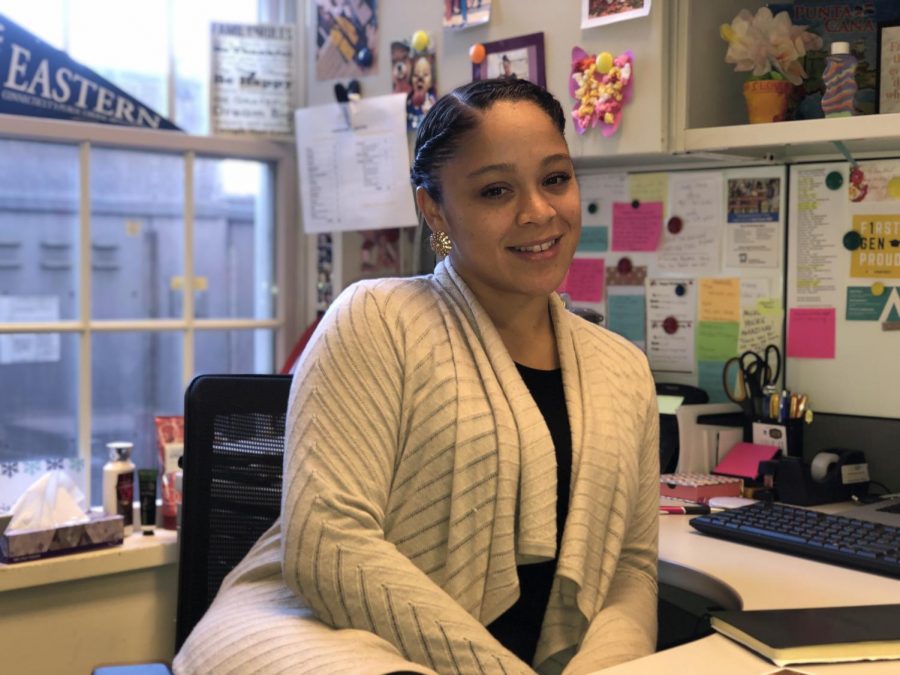AIC students “Get Real” about privilege
Assistant Director of Diversity Education, Alicia McKenzie.
November 16, 2019
Alicia McKenzie, AIC’s Assistant Director of Diversity Education, created the “Let’s Get Real” series in the spring of 2018. McKenzie said that during her first year here, she “wanted to be able to create a space where students of color would feel comfortable to have conversations about their everyday struggles.”
The “Let’s Get Real” series is a program in which students as well as staff and faculty can sit down together and share their experiences relating to topics that are often difficult to discuss.
“We talk about a variety of topics like microaggressions, privilege, and discrimination, and how they manage to navigate that every day,” McKenzie commented.
The topics discussed during “Let’s Get Real” include colorism, white privilege, identity, the LGBTQ+ community, and mental health. McKenzie highlighted one particular topic that got a lot of attention from the AIC community, which was the This Is America video by Childish Gambino.
The last session of the semester, which occurred on November 5, 2019, was entitled “Privilege, Yes It Exists.” The event was described as a way to unmask privilege and use it to help others.
“I think it’s super important for us to talk about privilege,” McKenzie said, “because we all have different levels of privilege. There’s different types of privilege and a lot of times we’re blind to it.”
She pointed out that by discussing this topic, “We each can recognize the different privileges that we have and how we can use those privileges to uplift and empower people around us and the ones that don’t have those privileges.”
Danica Johnson, a sophomore physical therapy major at AIC, was one of many in attendance for the “Let’s Get Real” event. “I really like the events,” Johnson commented. “They’re fun, they’re really informative, and you learn a lot while you’re there.”
The event was structured to guide the discussion rather than lead it, so McKenzie began by asking the group their opinions on what privilege is, followed by a more detailed explanation.
She also played a video depicting a privilege walk activity showing the different privileges that Buzzfeed employees grew up with. Johnson found the structure of the session helpful. “It was set up really well,” Johnson said, “because starting out by defining it really helped the video bring it home.”
The impact of such a program where students can sit down and talk about their differences is clear in the student response. Johnson went on to explain, “I’m Caucasian. I don’t experience racism really, which is a privilege for me, and so I don’t know these experiences. I hear about them from other people, but hearing first-hand accounts is a whole other thing. It allows me to have perspective and helps me to understand what I can do to help.”
“I feel like the program was really well-received by the students,” McKenzie said. “We had students open up about some very personal experiences and to me that’s one of the most beautiful parts… Students will come together and open up about their personal experiences with people that they don’t even know.”
From the inception of her series to the latest installment focusing on privilege, McKenzie has noticed a change in the demographic of participants in the discussion. McKenzie shared that “When it started, it was a solid little group five or six of us that would come together.”
She spoke about how it was a goal of hers to ultimately have as diverse of a group of participants as the topics being covered. “This last session, it was that,” McKenzie expressed.
“We were finally able to get to that place where you can look around the circle, and there are students that don’t look like each other in that space, who don’t come from the same backgrounds in that space, students from different socioeconomic statuses, language barriers, age gaps, and even power dynamics—with professionals there and students there.”
Reflecting on the “Let’s Get Real” series itself, McKenzie said, “That space has evolved from the five, six students that we started with to something so powerful that I’m just beyond grateful for.”
She continued, “I feel privileged to be able to have created something like this and see what it’s grown to and know that it has nothing to do with me. It’s the students and what they share. They keep talking about it and coming back and bringing people with them.”




Taylor Heggins • Nov 26, 2019 at 8:43 pm
Thank you for working to create such an open and welcoming environment for students of all different demographics to talk about the real stuff no one ever wants to talk about. I appreciate you for all of your hard work to push us to grow and get comfortable with being uncomfortable!
DeShawn • Nov 18, 2019 at 12:10 pm
I love how you capture the space. While reading, I felt I was there all over again. Great job on this article.